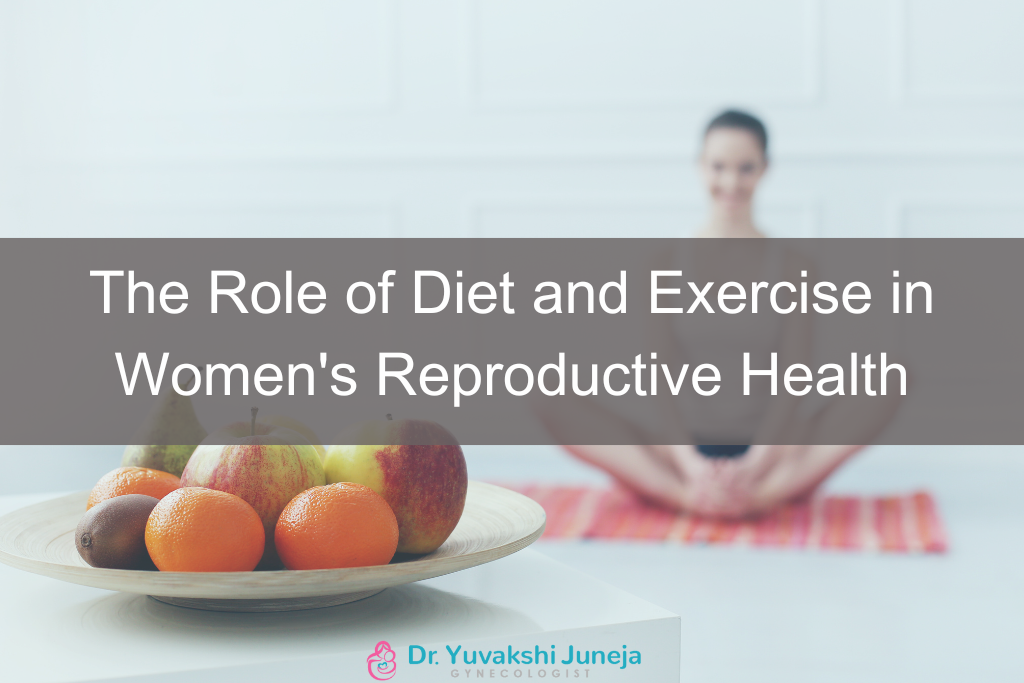The Role of Diet and Exercise in Women’s Reproductive Health

A women’s reproductive health is not just about the reproductive system itself; it’s about her overall physical health and well-being. The realm of reproductive health stands as a crucial aspect of a women’s overall health, with such important roles as diet and regular exercise. A women’s reproductive health is important to ensure that she can maintain hormonal balance, regulate her menstrual cycle, and optimize fertility. Yet, in the modern landscape of fast-paced living and high-stress levels, women need to understand the importance of diet in reproductive health.
In this explanatory guide, we will briefly discuss the role of diet and exercise in women’s reproductive health. Additionally, we will also highlight the self-care practices and gynecologist diet recommendations that a woman can incorporate into her lifestyle to support her reproductive health goals.
Importance of Diet in Reproductive Health

Does women’s reproductive health only mean focusing on the menstrual cycle, diet, and fertility? As a woman, ask yourself: is it about nurturing our bodies to maintain hormonal balance and supporting the ovulation process, or is it about ensuring overall wellness and reducing the risk of reproductive health issues such as polycystic ovary syndrome or endometriosis?
When it comes to maintaining the health of the reproductive system, it is essential to prioritize a balanced diet filled with nutrients, including folate, iron, and omega-3 fatty acids. By following a healthy diet and lifestyle, women can reduce the risk of diseases that arise from an unhealthful recovery system, such as infertility and menstrual irregularities.
Let’s take a look at the list of food items that you must include in your daily diet to support reproductive health and maintain overall wellness.
- Leafy Greens: Spinach (palak), fenugreek leaves (methi), amaranth leaves (chaulai), curry leaves (kadi patta), and coriander leaves (dhania).
- Berries: Blueberries, strawberries, and raspberries are packed with antioxidants, which help reduce inflammation and heal damaged reproductive health.
- Eggs: A complete source of protein and choline, which boost the fetal brain development process.
- Greek Yogurt
- Nuts and seeds
- Beans and legumes
In addition to the above-listed foods, don’t forget to include a lean source of protein in your daily diet. It will help in regulating the menstrual cycle and producing healthy eggs to maintain proper reproductive health.
Role of Exercise: Women’s Reproductive Health

When it comes to women’s reproductive health, regular exercise plays a crucial role in maintaining hormonal balance and promoting overall well-being. Incorporating physical activities into your daily routine can help regulate the menstrual cycle, reduce stress, and improve fertility.
Regularly exercising for around 45 to 60 minutes is beneficial for maintaining a healthy weight and reducing the risk of conditions that can affect reproductive health. Exercise can be done in any form, such as running, walking, swimming, yoga, gymnastics, etc., but at least perform it 3–4 times a week to see the benefits.
Let’s take a look at the benefits of exercise for women’s reproductive health:
- Hormonal Balance: Regular exercise reduces the level of stress hormones such as cortisol and increases the level of endorphins. These directly help in maintaining hormonal balance, which results in better reproductive health.
- Fertility: Research has concluded that regular exercise helps in improving fertility and promotes blood flow to reproductive organs. It reduces the insulin level and contributes to overall reproductive health. Additionally, exercise also helps with weight control and management, which are crucial for fertility.
- Mood Regulation: Exercises have shown a positive impact on mood and mental well-being, which positively impacts reproductive health. Regular physical activity helps in reducing the chances and symptoms of depression and anxiety, which are known to interfere with menstrual cycles and fertility.
Self-Care Practices for Supporting Women’s Reproductive Health

Taking care of reproductive health goes beyond the diet. It involves practicing self-care activities, which help promote overall well-being. Let’s take a look at some of the self-care practices that a woman should incorporate into her life to support a strong and healthy reproductive system:
- Consult Gynaecologist: By regularly consulting a female gynecologist in Delhi, you can ensure that your reproductive system is in good health and can easily address your concerns. Additionally, regular checkups and screenings can help in detecting any potential issues early on, which allows for prompt treatment and the prevention of complications.
- Prioritize sleep: Remember, the better you sleep, the better will be the condition of your reproductive health. Getting enough sleep is crucial for maintaining hormonal balance and overall well-being. So, aim for at least 7-9 hours of quality sleep to support reproductive health.
- Understand Your Body’s Signals: Pay attention to your body’s signals and seek medical advice if you notice any unusual symptoms or changes in the reproductive system. Trusting and honoring your body’s wisdom is essential for maintaining reproductive health.
- Stay Hydrated: Drink plenty of water throughout the day to stay hydrated. The more you drink water, the more your body will be able to flush out the toxins and be able to function properly. Dehydration can also lead to various issues, like urinary tract infections; hence, staying hydrated is key for reproductive health.
Conclusion
Diet and exercise are crucial in maintaining a women’s reproductive health. It is even more important for a woman to recognize the signs and symptoms of potential issues and to get in touch with a Gynaecologist in Delhi. Dr. Yuvkashi Juneja is a renowned and recognized Gynecologist Surgeon in Delhi and is known for providing expert care and guidance to women for their reproductive health needs. Don’t hesitate to schedule a consultation with her and get the necessary support and treatment for any reproductive health issues that you may have. Your health and well-being are important, so don’t wait to take proactive measures to care for your reproductive health.
